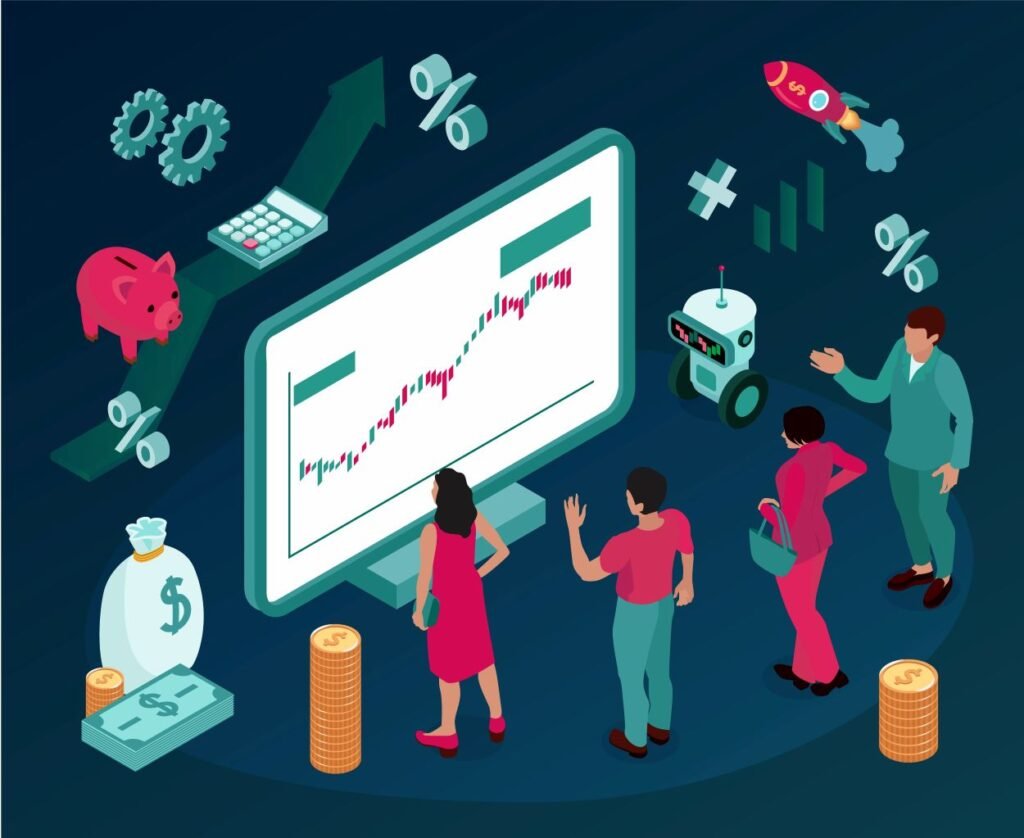Man-made brainpower (computer-based intelligence) has turned into a distinct advantage in numerous businesses, including the securities exchange, in the rapidly impacting universe of today. AI-based stock market predictions have gained significant attention and popularity due to their potential to provide valuable insights and enhance investment strategies. This article explores the growing influence of AI in the stock market, the benefits it offers, and the various techniques employed for accurate predictions.
Understanding Stock Market Predictions
A. The concept of stock market predictions-
An age-old practice that seeks to predict the future movement of stock values is making predictions about market trends. Investors and traders try to make educated judgments about buying, selling, or keeping stocks by examining historical data, market indications, and other pertinent considerations.
B. Traditional approaches vs. AI-based approaches-
Traditional approaches to stock market predictions often rely on fundamental analysis, technical analysis, and expert opinions. However, these methods have limitations and are prone to human biases. AI-based systems use machine learning algorithms to analyze enormous volumes of data, spot trends, and make predictions using statistical models.
C. Role of AI in analyzing large datasets-
The stock market generates an enormous amount of data daily, including historical prices, financial statements, news articles, social media sentiments, and more. AI excels in handling big data and can quickly process and extract meaningful insights from these datasets, enabling more accurate predictions.
How AI Works in Stock Market Predictions

A. Machine learning algorithms for stock market predictions
- Supervised learning models-
Supervised learning algorithms learn from labeled historical data to make predictions. They analyze past stock prices and associated features to identify patterns and relationships that can be used to forecast future prices.
- Unsupervised learning models-
Unsupervised learning techniques use unlabeled data and concentrate on uncovering underlying structures and patterns. They can discover clusters of similar stocks or identify anomalies that may indicate potential market movements.
- Reinforcement learning models-
Reinforcement learning algorithms learn by interacting with an environment and receiving feedback in the form of rewards or penalties. In stock market predictions, these models can optimize trading strategies by continuously adapting and learning from market dynamics.
B. Data preprocessing and feature engineering
- Data collection and cleaning-
High-quality and reliable data are essential for accurate predictions. AI algorithms require clean and well-structured data, free from errors and inconsistencies. Data collection involves gathering relevant data from various sources and ensuring its accuracy and completeness.
- Feature selection and extraction-
Feature selection involves choosing the most relevant variables or indicators that have a significant impact on stock prices. Feature extraction techniques can transform raw data into meaningful representations, capturing important patterns and relationships.
C. Training and testing AI models
- Training datasets-
AI models are trained using historical data, where the inputs are past stock prices, indicators, and other relevant features, and the outputs are the corresponding future prices or price movements. The models learn from this data to generalize patterns and make predictions.
- Validation and evaluation techniques-
To assess the performance of AI models, validation and evaluation techniques are employed. These involve testing the models on unseen data to measure their accuracy, precision, recall, and other relevant metrics.
Benefits of AI-based Stock Market Predictions

A. Increased accuracy in predicting stock market trends
AI algorithms are able to examine enormous volumes of data, spot complex patterns, and make predictions using statistical models. This leads to more accurate predictions compared to traditional approaches, enhancing investment decisions.
B. Enhanced speed and efficiency of analysis
Large datasets may be processed and analyzed by AI algorithms very quickly, giving real-time insights into stock market patterns. This enables investors and traders to make timely decisions and capitalize on market opportunities.
C. Reduction of human biases and emotions
Human emotions and biases often cloud judgment in stock market analysis. AI-based predictions eliminate such biases, providing objective and data-driven insights, which can lead to more rational investment strategies.
D. Identifying complex patterns and correlations
AI models excel at identifying complex patterns and correlations that may not be obvious to humans. They can analyze multiple factors simultaneously, including historical data, news sentiment, and market indicators, to uncover hidden relationships.
E. Real-time monitoring and decision-making
AI algorithms can continuously monitor the stock market, processing real-time data and providing instant alerts or recommendations. This makes it possible for investors to respond to market movements swiftly and modify their strategy as necessary.
Popular AI-based Stock Market Prediction Techniques-

A. Technical analysis using AI:-
- Moving averages and trend analysis:-
AI algorithms can analyze moving averages and identify trends in stock prices. They can generate buy or sell signals based on the crossover of different moving averages, helping investors determine optimal entry or exit points.
- Support and resistance levels:-
AI algorithms can identify support and resistance levels, which are price levels where stocks tend to find buying or selling pressure. This information assists investors in making decisions regarding potential price breakouts or reversals.
B. Sentiment analysis and natural language processing:-
AI techniques can analyze news articles, social media posts, and other textual data to gauge market sentiment. By extracting sentiments and opinions, AI models can assess the collective sentiment towards specific stocks or sectors, influencing predictions.
C. Deep learning models for stock market predictions:-
Deep learning models, like neural networks, are capable of discovering intricate patterns and connections from enormous volumes of data. They excel at image recognition, natural language processing, and sequential data analysis, making them valuable tools for stock market predictions.
D. Genetic algorithms and optimization techniques:-
Genetic algorithms simulate the process of natural selection to optimize trading strategies. These algorithms evolve and adapt based on performance, allowing investors to discover optimal combinations of indicators, parameters, and trading rules.
Challenges and Limitations of AI-based Stock Market Predictions-
A. Volatility and unpredictability of the stock market:-
The financial exchange is impacted by many factors, including the condition of the economy, international happenings, and financial backer feeling. Its inherent volatility and unpredictability pose challenges for AI models, as past patterns may not always repeat.
B. Data quality and reliability issues:-
The quality and reliability of data used for training AI models are crucial. Inaccurate or incomplete data can lead to misleading Incomplete or inaccurate data might produce false forecasts. predictions. Ensuring data integrity and addressing data biases is an ongoing challenge in AI-based stock market predictions.
C. Overfitting and underfitting of AI models:-
Overfitting occurs when an AI model becomes too specific to the training data, resulting in poor generalization to new data. Underfitting, on the other hand, occurs when a model fails to capture important patterns. To prevent these problems, it is essential to balance model complexity.
D. Ethical concerns and regulatory challenges:-
The use of AI in stock market predictions raises ethical concerns, such as market manipulation or unfair advantage. Regulatory bodies are actively monitoring these developments to ensure transparency, fairness, and compliance with existing regulations.
Successful Case Studies of AI-based Stock Market Predictions-

A. Case study 1: Company X’s AI-powered trading algorithm:-
Company X developed an AI-powered trading algorithm that combines technical analysis, sentiment analysis, and deep learning models. The algorithm consistently outperformed traditional approaches, generating higher returns and minimizing risks.
B. Case study 2: Hedge fund’s use of AI for stock market predictions:-
A prominent hedge fund incorporated AI models into their investment strategies. By leveraging advanced machine learning algorithms, they achieved superior risk-adjusted returns and gained a competitive edge in the market.
Best Practices for Utilizing AI in Stock Market Predictions-
A. Diversification and risk management strategies:-
AI-based predictions should be used as one tool among many in a diversified investment portfolio. To reduce possible losses, appropriate risk management techniques including asset allocation and diversification should be used.
B. Combining AI predictions with fundamental analysis:-
AI predictions can be complemented with traditional fundamental analysis, which considers factors like financial statements, industry trends, and competitive analysis. This combination provides a holistic view and strengthens investment decisions.
C. Regular model updating and adaptation:-
In order to include fresh data and adjust to shifting market conditions, AI models need be updated often. Continuous monitoring of model performance and recalibration is necessary to maintain accuracy and relevance.
Conclusion:-
AI-based stock market predictions have revolutionized the way investors approach the stock market. The advantages of AI, including improved speed, accuracy, and fewer biases, have made it a crucial tool for making wise investment decisions. When using AI predictions, it’s crucial to keep in mind their drawbacks and difficulties and combine them with other analysis methods. Future stock market projections are anticipated to be more significantly impacted by AI as it advances.
our other articles- Harpy Chat AI: The Ultimate Solution for Seamless Communication in 2023


1 thought on “Unleash the Growth of AI-Based Stock Market Predictions 2023”
Comments are closed.